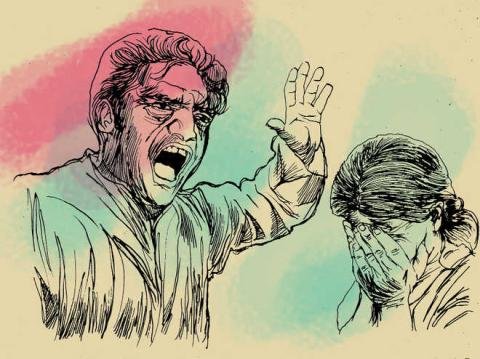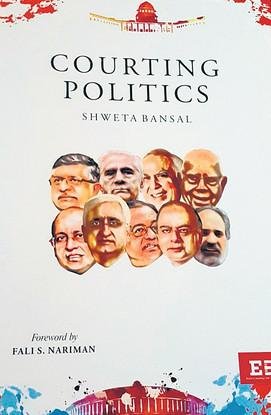Why have we become so violent?...


The sun was pleasantly inviting. Around 11, I trotted over to the neighbourhood park for that brisk walk the doctors are always recommending.
The idea of a peaceful, meditative walk came to an abrupt end. Angry voices assailed the ear.
Right there in the middle of the park, a couple seemed to be having an argument, a conversation that probably they did not want to have at home.
From their clothes, shoes, it appeared to be a middle class couple; the wife was blasé, went on drying her hair in the sun.
The man was loud, vulgar and obscene. Every single four-letter expletive was being flung in each sentence.
My first thought was one of great dismay; there were children and ladies around and this man seemed totally oblivious to his own vulgarity and crudeness.
All the manly violence a man can visit on a female was being threatened. The remarks, it seemed, were directed at her family. The wife seemed unfazed and remained unprovoked.
I sat down on a nearby bench, trying to figure out this unpleasant tableau of domestic disharmony. And also, why have we become such a violent society?
A few days later, we had this horrible story of a 19-year-old girl killing her younger brother, all because the sibling had spilled the beans about her having an affair. The extreme brutality that this young girl could summon is chilling. What social and cultural ecosystem would propel a girl to undertake a violent murder of her own brother?
Something very wrong, very disagreeable is happening in our society, and none of us seems to be able to want to do anything about it.
Meanwhile, the politician is busy practising his divisive craft, creating cleavages and conflicts, accusing the other of being anti this or pro that. The social tranquillity is gone; disintegration is setting in.
In the process, the politician is encouraging us to be rude, vicious to others in his defence.
We do not have the forces and voices that would generate a countervailing cultural and social narrative. There are no social leaders/reformers who would stand apart and away from the quarrelsome political crowd and be a different moral pole.
There is no Vinoba Bhave, not even a JP, who would not get trapped in the politicians’ web.
No doubt, there is no dearth of the babas and swamis and gurus, but each one of them has succumbed to the allurement of commercial entrepreneurship.
Outwardly, we are becoming more and more ritualistically religious; the elevating, ennobling content of religion is getting depleted. Maybe, this is the price we have to pay for becoming a consumerist society and for our unrelenting urbanisation. We all end up being deracinated souls.
* * * * * * * *T has been more than a week since the four senior judges of the Supreme Court decided to go public with their grievances with the Chief Justice of India.
After that bombshell, we have had conflicting reports emanating from the inner sanctum as to what extent the gentlemen in the black robes have patched up — or have not patched up.
Everybody is asking a simple question: Why did the Four Judges take such a precipitous undertaking? Has the court’s izzat not been left in tatters? What happens to Justice Gogoi? Will he get tricked out of a chief justice innings after Justice Deepak Misra finishes his tenure?
Both sides have practised the art of reticence. There is an uneasy truce, as the old cliché goes. But it is difficult to avoid the conclusion that the issues are primarily political or at least political in implications, which the court as an institution is or will be called upon to deal with.
The Four Dissenters have not taken the moral option — resign, go home. But, perhaps, they know the cast of characters. And, the headlines will inevitably give way to another ‘crisis’ and the four would be forgotten. The court will fall in step with the government and a new normality will get settled in.
Courting Politics is an interestingly conceptualised book about nine lawyers in political life. These lawyers have lived interesting lives and their tale is interestingly told by Shweta Bansal.
Each has been given an arresting — and, in most cases, an apt — sobriquet: Ram Jethmalani (The Daredevil), Shanti Bhushan (The lawyer of Emerging India), P Chidambaram (The Reformer-in-Chief), Muzaffar Hussain Baig (The Gentleman), Kapil Sibal (The Artiste), Arun Jaitley (The Man for all Seasons), Salman Khurshid (The Debonair Man), Ravi Shankar Prasad (The Lawyer of Lord Rama), Abhishek Manu Singhvi (The Ultimate Multitakser).
The working premise of Courting Politics is that because these nine were lawyers, they could make a kind of difference that someone with a different background — say, an engineer or a charter accountant — could not make. That case does not get fully made.
Because each one of them is so talented, their very presence in the political arena made a difference; but, what is missing from the tale is what, if any, contribution these legal luminaries made to enriching our constitutional values and traditions.
No doubt, there are interesting personal details, bringing out qualities of character, talent, industriousness, capacity for application, perseverance and a certain rectitude. Of course, there are inflated egos and none of them seems occasionally a stranger to small-mindedness. We learn of young P Chidambaram defying his parents in the choice of his life partner; we also learn of how and why Arun Jaitley failed so gloriously in his first Lok Sabha contest.
For example, the Ram Jethmalani chapter suggests that since childhood, “Ram has abhorred authority and restraint on freedom.” That gives us a clue to his choice of clients and cases. We get a picture of a brilliantly combative, fabulously erratic lawyer, who though did contribute to public life, yet still made an insignificant politician. There is a well-deserved reference to Ram Jethmalani’s fundamental contribution: setting up of the National Law School of India University (the concept has become a consecrated template for modern law education in India).
But we do learn quite a lot about men in public life from Jethmalani’s assessments — say, of, LK Advani and Vajpayee. That he is so fiercely his own man made him the best criminal lawyer in India. “He listens to his own inner drum, marches to it and he is willing to face the consequences of that,” Shweta Bansal notes. Her summation of Ram Jethmalani is irrefutable: “He does not enjoy the august reputation that his life commands.”
Of the nine lives discussed in Courting Politics, it is Shanti Bhushan, the least flamboyant of the lot, who comes across as the most centred legal mind. As Law Minister during the Janata Party government, he refused to supersede YY Chandrachud as the Chief Justice of India — which would have meant ignoring the principle of seniority — because during the Emergency, he was part of the Bench that decided the seminal case, the ADM, Jabalpur v. Shivkant Shukla (the habeas corpus case).
Most curiously, the Shanti Bhushan chapter touches upon some of the dramatis personae involved in the current controversy in the Supreme Court and how a petition in the Sahara diary case was disposed of. He concludes ominously: “It reminds me of the Emergency during which the judiciary could not take on the prime minister.”
At the beginning of the book, there is a brief introduction by the redoubtable Fali Nariman, and he ends with a hope that “the erudite men whose lives are unfolded in this book will not fail us when the time comes — as it will — to save the Constitution and the laws.”
On that count, there is a certain incompleteness. The sum total of these tales does not give us a larger assurance or impart a necessary reaffirmation that there is an inherent correctness and solidity to our republic because guys like these Nine are up and around.
* * * * * * * *